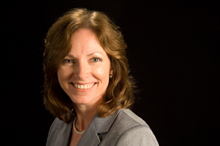Pardo to serve on National Science Foundation DataOne Working Group on Socio-Cultural Issues
 Theresa Pardo, CTG director, has been nominated to serve as a member of the National Science Foundation (NSF) DataONE (Observation Network for Earth) Working Group on Socio-Cultural Issues. Specifically, she will work as a member of the Usability and Assessment Working Group.
Theresa Pardo, CTG director, has been nominated to serve as a member of the National Science Foundation (NSF) DataONE (Observation Network for Earth) Working Group on Socio-Cultural Issues. Specifically, she will work as a member of the Usability and Assessment Working Group.
“I look forward to the challenge of serving on NSF’s DataOne Working Group and contributing my expertise on information sharing and digital preservation to the group’s work,” said Theresa Pardo.
DataONE is part of the NSF DataNet initiative, which is designed to provide archival infrastructure for science data. DataNet projects bring together scientists, librarians, information scientists, social scientists, and computer scientists to tackle the difficult issues of data sharing, data management, and digital data preservation.
DataONE focuses on data and data users in earth and environmental sciences. The DataONE working structure includes eight Working Groups (including both Community Engagement topics like Education, Sustainability & Governance, and Citizen Science and Outreach as well as Cyberinfrastructure topics such as Federated Security, Semantics, and Scientific Workflows). The Socio-Cultural Issues Working Group focuses on understanding the sociological and cultural issues that inhibit effective data sharing and long-term preservation and on devising and implementing strategies to overcome those barriers. The group will identify and engage with stakeholder groups to facilitate transformation of cultures across the breadth of stakeholders, including identifying incentives and disincentives to preparing data for sharing and preservation.
As one of approximately a dozen members, Pardo will participate in two face-to-face meetings per year (the first of which is scheduled for May 25 to 27, 2010 in Albuquerque, NM and is to be held in conjunction with other DataONE Working Group Meetings). In addition, Pardo will participate in conference calls outside of meetings, contribute to publications, and provide advice on designing research instruments and studies.